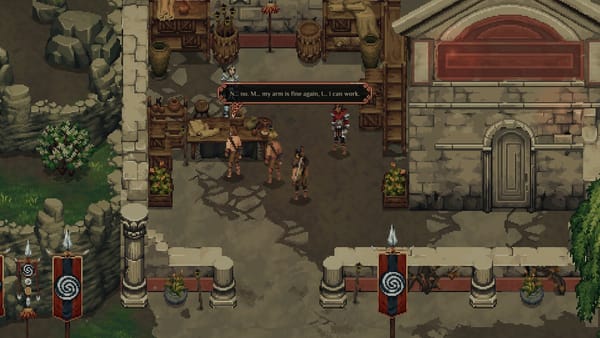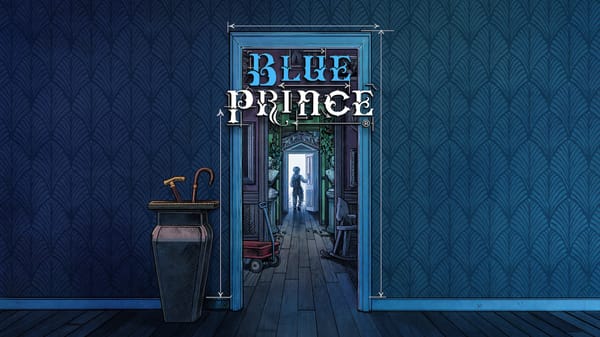Wylde Flowers and farming my heart
Guest Backlog by Alyssa Collins
[Editor’s Note: Today’s Backlog comes to us from Alyssa Collins, assistant professor of English and African American Studies at the University of South Carolina. You might remember Alyssa from the recent Dredge Backchat, or, if you’re from a very specific D&D group, any number of gossip-obsessed bards and other ne’er-do-wells. Enjoy her take on Wylde Flowers! -Grayson]
The first time I played Wylde Flowers, I fucked up my wrists. As a writer, professor, hobbyist potter, and habitual doomscroller, lately I feel like I’m constantly staving off some sort of horrific carpal tunnel event. I’m more conscious of wrist health these days than I want to be. But the weekend I got Wylde Flowers, I pushed it, because I really wanted to farm, I wanted magic, and I wanted queer romance, all of which Wylde Flowers had in abundance. To my wrists’ detriment, somehow I got sucked into more story than I’m used to from your average farm sim.
I came across Wylde Flowers on TikTok (of course). I’d been looking for a new cozy sim after feeling a bit frustrated by the promising Bear and Breakfast, which I’m sure is a wonderful game on PC, but the Switch port left something to be desired. Stardew Valley was calling, but I was reluctant to surrender my life to yet another farm, and honestly I couldn’t find anyone who wanted to fish for me.1 Thankfully, Wylde Flowers called out to me, not only because, well, farming, but also lots of witchy intrigue and well-written dialogue—all fully voice-acted. A farming sim without dialogue boxes. Can you imagine?
You play as Tara Wylde, who has left the big city after a breakup to help with her grandmother’s farm. A pretty standard setup for a farming sim. Less standard is that Wylde Flowers is limited when it comes to customization. The game puts time and energy into character, dialogue, and story, but at first, there isn’t so much as customizable clothing.2 I initially found myself put off by this lack of such a genre hallmark, but as I learned more about Wylde Flowers’ world and its inhabitants, I found myself thinking less about overalls and more about the surprising depth of the game’s characters.
Early on, I was surprised to find myself in a conversation with Parker, a Black carpenter and father of two cute (and very mischievous) twins. While chatting with Tara about his family, Parker mentions fearing his kids’ pranks had been pathologized by members of the community because of their race. I was a bit blindsided by this conversation, not because it wouldn’t be a real concern for a father like Parker, but because the creators took into account the lived experiences of their at-first-glance color blind cast. In addition to Parker, you’ll get to know Kim Izumi, a nonbinary butcher, who is managing the complicated love and expectations of a faraway family. Or Sophia Moretti, the Jewish Italian owner of the local diner, who is raising a teenage daughter after the recent death of her husband. As I explored Fairhaven, I found a diverse community that felt grounded in reality.3
Wylde Flowers establishes these community connections in its tutorial, where the relationships between townspeople are given context and history. Tara arrives in Fairhaven to help out her grandmother Hazel with her farm. Though Hazel is feeble, she shows you around the farm and prompts you to grow the friendships you need to be a successful farmer. It becomes clear that many, if not all, of Fairhaven’s residents are helping you because they love your grandma and remember your childhood antics. Hazel teaches you to farm, cook, and forage. She also offers some advice about the state of your love life. The whole thing is really nice. So many farming sims either have players inherit a farm from an absent (or dead) relative or enter the community as a complete stranger. Wylde Flowers, by contrast, lets you not only reconnect with a distant relative, but see firsthand just how important Hazel is to the community. A community that also includes witches.
Alongside a tour of the farm, Hazel also introduces Tara to her witchy nature, and to the local coven that has existed longer than the town itself. A thing to know about me is that I love lore. Videogame history and gossip are second only to various Housewives and the drama I generate for my long-suffering Dungeons & Dragons friends.4 What I love about Wylde Flowers is the sheer amount of lore, regular and magical, that is waiting to be uncovered like a crop from a seedbed. While the amount of information and tasks new players are asked to keep track of can be initially overwhelming—sometimes there just isn’t enough time to go to visit the sacred circle and plant all of my potatoes, thank you very much—the multiple social circles and storylines really make you feel incorporated into the community. Without really trying, you soon find you have a stake in your family, the island, and its people.
This connection starts, though, with Hazel. So when, at the end of the first spring, she passes, it’s a genuine shock. I was surprised by how much emotion I felt at such an early moment in the game, and I don’t think it was just because it was also 3 am. It’s a bold thing to insert a fairly earnest engagement with grief as the capstone of your games tutorial. I’m used to some festival or in-town event prodding you into a farming game, but the first community event of Wylde Flowers is Hazel’s funeral. Immediately, the game is telling you it is not playing around when it comes to narratives of joy, friendship, fear, acceptance, suspicion, love, personal growth, and the dangers of law-and-order politicians or quasi-cultish enlightenment. As the game progresses, there are electoral politics to consider, conversations about identity, and anxieties over neoliberal gentrification. You get up to a lot more than squash in this game.
These elements have kept me engaged, albeit with hard time limits now, because I am an adult who would like to not aggravate her wrists. The way the community is written in Fairhaven made me want to keep up with them and see what will happen in the story. To be fair, I have no idea how this will affect replayability or saves that last longer than the first narrative year of the game. As to how it will stack up against similar games like Stardew, I can’t exactly say right now. But between its diverse community elements, lots of platform availability (I played on Switch, and the game is available to download on Apple Arcade), and a character that can carry unlimited inventory (more of this in other games, please), Wylde Flowers stands out in a crowded market of cozy farming sims.
In Fairhaven, my heart and bags are full. And that’s honestly enough.




